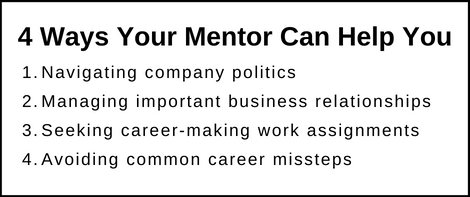This article is Part 1 of a 3-part series.
- Part 2: How to Find a Mentor
- Part 3: 10 Ways a Mentor is Different than a Champion ***COMING SOON***
The Definition of a Mentor:
A Mentor is an informal career advisor who shares skills, knowledge, and expertise with a less experienced Mentee (or protégé) and guides the Mentee toward professional growth.
Mentors are highly experienced in the job, profession, field, and/or industry of the Mentee.
Usually, seasoned leaders with many years of experience, Business Mentors possess extensive business knowledge and significant leadership success.
Mentors are invaluable in helping you navigate your career and your company. Politically savvy and closely familiar with your business, industry, company, or role, they often have valuable insider information and they draw on their knowledge and expertise to provide you with information, ideas, and advice that will help you move forward successfully in your career.
As a young female Technical Analyst in the mid-1990s for a large Aerospace company, I was lucky enough to receive mentoring from the Chief of Staff for the Vice President of Logistics.
In this male-dominated Air Force-oriented company, I was at a loss on how to navigate the political landscape.
The Chief of Staff helped me understand how to communicate with the upper management, the Vice President and his direct reports (“get to the point” quickly) and how to communicate with our Air Force counterparts (respect “the dominance hierarchy” and “don’t back down”).
His guidance was invaluable for me in creating success in a company culture that was very foreign to me. In a very short time, I was given the highest raise in the Logistics department, received awards, and was offered plum management positions.
Understanding the role of a Mentor will help you leverage the relationship more effectively.
The Definition of Mentoring
Mentoring is the transmission of knowledge, skills, expertise, and support through regular meetings (and just-in-time conversations) to help the Mentee grow, develop professionally, and build their career.
What is a Mentor versus a Mentee?
A Mentor gives advice to the Mentee. The Mentee is the person who receives advice and guidance from the Mentor.
Who Should Be Your Mentor?
Most often, your Mentor will be in a higher position than yours, most likely a position you are aiming for; but they can also work in a:
- A similar position, but have more experience than you do
- A position at the same level that is related to your position (and have more experience than you do)
Your Mentor usually will not have direct responsibility for your work output (in other words, they shouldn’t be your boss or your boss’ boss).
Your Boss Shouldn’t Be Your Mentor
Your boss is biased because the outcome of your professional development impacts them personally and impacts their department. They have “skin in the game,” so it’s difficult for them to mentor you from a perspective of guiding you toward only what is best for you. Also, they are unable to give you an “outsider” perspective.
Your boss may mentor you from time to time, but you won’t have a pure mentoring relationship with them. They must be your boss as well.
Within your mentoring relationship, your Mentor should focus solely on supporting you in growing professionally.
Your Mentor Can be Internal or External to Your Company
A Mentor can work in your company or outside your company (there are advantages to both).
Like your boss, one challenge with an internal mentor is that they cannot be fully unbiased (although they are most often less biased than your boss).
A drawback of an external Mentor is that they don’t have specific knowledge of your company’s political structure and inner workings.
In addition, internal Mentors (those within your company) may Mentor you on the clock, but external Mentors are usually unpaid advisors.
What Does a Mentor Do?
The Mentor-Mentee Relationship Structure
You will meet with your workplace Mentor on the phone or in-person at least monthly for 15-90 minutes.
NOTE: Short mentoring sessions can be very effective, and we find that leaders spend more time preparing for them so that the concentrated time is very powerful.
Most Mentors are available for impromptu questions that come up in between meetings (via email or phone call).
Your Mentor will meet with you to answer your job, business, technical, leadership, industry, and/or career questions; impart lessons learned through their career; and be a sounding board for the challenges you encounter.
If you desire, your Mentor may help you identify career options within your field or industry and the steps you need to take to land your next promotion.
They may help with identifying:
- Classes to take, degrees to seek, certifications to obtain
- Organizations to join and participate in
- Relationships to build
- Lateral career moves to make
- Successes to seek
They may also point you toward:
- Who to get to know in your company
- How to sell yourself
- How to manage your personal brand within your company and industry
The Difference Between a Mentor and a Leadership Coach (or Executive Coach)
Knowing the difference between a Mentor and a Leadership Coach will deepen your understanding of the Mentor’s role. There is some overlap in the roles of Mentors and Coaches, but there are more differences than similarities.
The Mentor is more focused on helping the Mentee with technical and industry-specific skills and knowledge, while the Leadership Coach is more focused on helping the leader develop self-understanding, become a more inspirational leader, leverage their strengths, align with their values, and build their resilience.
There are many similar benefits between Mentors and Executive Coaches as well:
- They accelerate learning
- They provide customized just-in-time learning
- They increase retention
- Offer a sounding board
- Provide unique insights
- Help you look at the big picture
One of the advantages of a Leadership Coach is that they are unbiased and are trained and bound by their ethical standards to keep your information confidential. This allows you to be more open and honest with your coach and to build a deeper, more trusting relationship with your Leadership Coach.
Executive Coaches are trained to help you delve deep into your beliefs, values, communication style, emotions, strengths, sense of accountability, and inner barriers. They will also help you examine your habits and behavioral patterns and get to the root of what causes the behaviors that are not currently productive.
Most importantly, your Executive Coach is skilled at helping you design improvement actions to help you become the best, most authentic leader you can be.
The advantages of a Mentor include that they:
- Have very specific knowledge of your role, job, field, company and/or industry and can pass on that knowledge to you
- Are most often experienced in what you wish to do in the future
- Most often know the personalities you are dealing with and the company dynamics that shape how people in your company interact
We recommend having both a Mentor and a Leadership Coach (or Executive Coach) either simultaneously, in succession, or alternating. To learn more about what Executive Coaches do, read our article: What is Executive Coaching?
The table below gives key differences between a Mentor and a Coach.
Mentor Versus Leadership Coach Role
| Mentor | Coach |
|---|---|
| Provides job function, career, or industry-specific guidance, advice, and information. | Helps you access and synthesize your own ideas. Offers additional ideas and approaches you to choose from. Helps you explore and analyze career options. Coaches most often don’t provide advice. |
| Has experience in and are knowledgeable about your job, company, industry, field, or a related field. | Has experience helping people achieve their potential and may have experience in your field or a related field or have coached people in your career or industry. Are knowledgeable about leadership approaches, models, and tools. Are skilled in processes and tools that will help you develop as a leader. |
| Answers your technical and industry-specific questions, offers advice based on experience in your field, helps with day-to-day issues and challenges, and helps you set and achieve career goals. | Helps you: – Access your wisdom on how to handle day-to-day issues and offers ideas |
| Identifies specific strategies you can use in your company and/or industry to overcome barriers to your success. | Helps you build skill in overcoming barriers that will apply to barriers you encounter now, and in the future. These skills will be transferrable to other positions and industries. |
| Offers an organizational or industry perspective. | Offers a more general outsider perspective and helps you develop ways to create perspective for yourself. |
| Aren’t usually involved in your task accountability. | Supports you in holding yourself accountable to completing your selected tasks and goals. |
| Promotes organizational or industry awareness. | Promotes self-awareness and digs deep into who you are to help you evolve into a more effective leader. |
| Helps you develop job, field, industry, and corporate knowledge. | Helps you understand your personality and how it impacts how you work and lead. |
| Most often works with you in an informal arrangement, unless they are part of your company’s formal mentoring program. | Establishes a formal, signed agreement with specific guidelines, policies, procedures, and ethical standards. |
| Doesn’t usually use assessments. | Skilled in debriefing personality, communication, values, personal, emotional intelligence, learning style, and career assessments to help you create self-awareness and identify areas for improvement. |
| Are often not trained to be a Mentor. If they are trained, it’s usually a short program offered to those participating in a formal Mentoring Program at your company. | Are – Most often trained (a minimum of 40 hour for ACC and 240 hour for MCC level) – Certified in Coaching by the ICF or have certification in work – Skilled in the ICF Core Competencies NOTE: Be wary of Coaches who are not ICF-Certified. |
| Most often are unbiased, but may have some biases since they are in your company or industry and/or may know the people you interact with. | Are trained to be unbiased. Should not know people in your company or industry beyond acquaintance and are ethically bound to not obtain personal gain from you or your company. |
| Should keep your information confidential. | Are required to keep your information confidential by the ICF Code of Ethics. |
Mentor Versus Champion
It’s also important to understand the difference between a Mentor and a Champion to fully understand the role of your Mentor.
Read our article on the differences to further build your ability to leverage your Mentor effectively. ***COMING SOON***
Do You Need a Mentor?
The answer is: YES!!!!!
No matter what your position, field, or level, you can benefit from having a Mentor.
You might think that if you’re in a high-level leadership role, you don’t need a Mentor; but that’s not the case.
Even if you’re a CEO with many years of leadership experience, you can benefit from the guidance and wisdom of a Mentor.
Also, CEOs have few people they can confide in. Having a Mentor (or a Leadership Coach) affords a CEO a confidential sounding board and to continuously learn about their job, career, and industry.
In an article in Harvard Business Review, ”CEOs Need Mentors Too,” Suzanne de Janasz and Maury Periperl, stated that they “surveyed 45 CEOs who have formal mentoring arrangements, and 71% said they were certain that company performance had improved as a result” of their having a mentor.
Even CEOs Warren Buffet, Jeff Bezos, and Gary Kelly have had mentors.
Women Leaders and Mentors
Being mentored is a key factor in moving up the corporate ladder. In one example, the Human Resources department of Sun Microsystems compared the career progress of 1,000 employees over a 5-year period and found that employees who received mentoring were “promoted FIVE times more often than people who didn’t have mentors.”
In the past, women haven’t had access to Mentors or have not asked for them. This has adversely impacted the career trajectory of many capable women.
Luckily, things are changing, and savvy women leaders aren’t waiting to get paired up with Mentors; they are seeking mentors for themselves.
Mentoring and Inclusivity
Mentoring is an effective way to support inclusivity. Cornell University’s School of Industrial and Labor Relations “found that mentoring programs dramatically improved promotion and retention rates for minorities and women—15 to 38 percent as compared to non-mentored employees.”
We highly recommend you work with a Mentor off and on or continuously throughout your career.
Be the Leader you’ve always wanted to be!





 Donna Schilder
Donna Schilder Donna Schilder
Donna Schilder